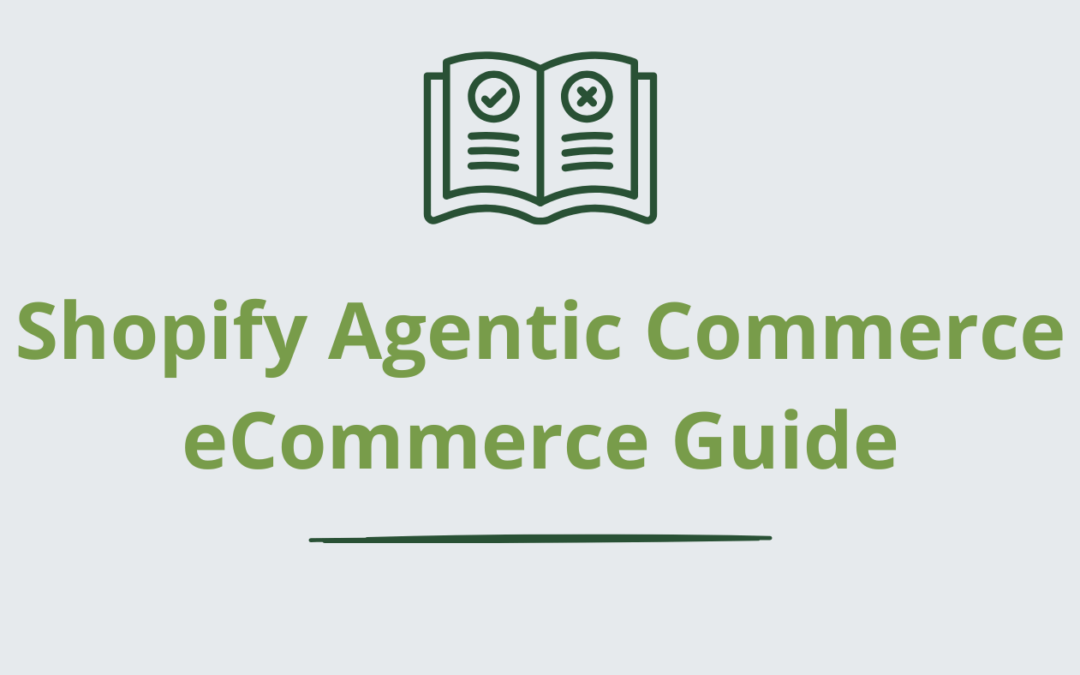Executive Overview: The Dawn of Agentic Commerce with Shopify
Agentic commerce represents the next evolution of online shopping, where AI-powered agents autonomously handle the entire purchasing journey for a consumer from product discovery to secure checkout. This shifts the user’s role from active shopper to delegator, allowing for a more efficient and personalized experience.
Historically, building such a system has been complex and fragmented. Shopify is simplifying this for its millions of merchants by providing a unified solution built on three core tools: the Shopify Catalog, which offers global product access; the Universal Cart, which manages items from multiple stores; and the Checkout Kit, which provides a secure, high-converting checkout that handles compliance.
This suite of tools allows e-commerce businesses to seamlessly integrate native shopping capabilities into AI agents. For store owners, this is a critical opportunity to capture new revenue streams and improve the customer journey, all without the burden of managing complex technical infrastructure, payment processing, or compliance requirements.
Tadpull ensures your Shopify product data is structured and optimized so AI agents can discover and recommend your brand in the emerging world of agentic commerce. By cleaning and enriching your catalog with the right tags, descriptions, and inventory data, Tadpull not only prepares you for AI-driven search but also positions you to fully leverage AEO and GEO tools. This leads to increased visibility, better performance in AI queries, and long-term competitive advantage as agentic traffic scales.
Agentic Commerce: What It Is and How Shopify Is Making It a Reality
Agentic commerce is the next frontier of online shopping, where AI-powered agents act on behalf of a consumer to autonomously search, compare, and purchase products. Unlike simple chatbots that respond to a single query, these agents can handle complex, multi-step tasks that span entire conversations and even multiple stores. They are essentially a personal shopping assistant that never sleeps, capable of finding the best product for a customer based on a deep understanding of their needs.
This new shopping paradigm shifts the user’s role from active browser to passive delegator. Instead of manually searching for products, customers can simply tell an agent what they’re looking for—for example, “Find me a smudge-proof mascara for sensitive skin that’s easy to remove and under $20.” The agent then handles the entire process, presenting options, and completing the purchase with minimal human intervention.
This is a massive leap for e-commerce, and platforms are racing to provide the infrastructure to support it. Shopify, a leader in e-commerce, is rolling out a suite of new tools to make this a reality for its millions of merchants, providing them a direct pathway to this new customer experience.
Why Shopify is Driving the Shift to Agentic Commerce
Historically, adding shopping capabilities to an AI agent has been a complex and fragmented process for e-commerce businesses. Store owners and developers had to manually integrate product search, manage a cart, handle a secure checkout, and deal with various compliance requirements. Shopify is simplifying this by providing a unified solution that handles these complexities, allowing brands to focus on what they do best: their products and their brand experience.
Shopify’s strategy is to bring native shopping capabilities directly into any AI conversation. It’s doing this with three powerful tools:
- The Shopify Catalog: This API gives your agent access to hundreds of millions of products from Shopify merchants globally. This is about providing real-time inventory and localized pricing. To reduce duplicates and improve relevance, Shopify clusters products with the same SKU into a universal product ID, ensuring customers find exactly what they’re looking for. The Catalog also provides rich media resources and UI components that can be used to display search results directly within the agent’s interface, handling complex variant structures, subscriptions, and bundles with ease.
- The Universal Cart: One of the biggest challenges in agentic commerce is managing a shopping cart that can hold items from multiple stores. The Universal Cart solves this by providing a single place to hold items from different Shopify merchants. This allows AI agents to handle complex shopping tasks that may involve multiple conversations and various stores, all while making it easy for the customer to track their desired purchases. For merchants, this means a higher likelihood of capturing a multi-item sale.
- The Checkout Kit: This is the final and most crucial piece of the puzzle for driving revenue. The Checkout Kit allows the agent to load the merchant’s secure checkout flow, combining your brand’s unique business customizations with your agent’s branding. It works seamlessly with Shop Pay and is known for being one of the highest-converting checkouts on the web. Importantly, using the Checkout Kit significantly simplifies compliance requirements, such as GDPR and PCI DSS, removing a major hurdle for e-commerce businesses.
These three tools work together to create a seamless, end-to-end shopping experience powered by AI, from the initial conversational search to the final secure payment, ultimately boosting customer trust and conversion rates.
How to Get Started with Shopify’s Agentic Commerce Tools
If you are an e-commerce business owner or a marketing professional looking to leverage this new technology, here’s how to begin:
- Request Access: The first step is to work with your development team or agency, like Tadpull – a Shopify Partner, to explore the documentation and request access to Shopify’s agentic commerce tools. These tools are often available in a beta or developer preview.
- Utilize the APIs: Integrate the Shopify Catalog API to enable seamless product discovery and the Universal Cart to manage items from various stores. This allows your brand to be a part of the AI-driven customer journey.
- Implement the Checkout Kit: Use the Checkout Kit to handle the payment process. This allows you to leverage Shopify’s secure and high-converting checkout without having to build a payment system from scratch, directly contributing to your bottom line.
The Foundation: Why High-Quality Product Data is More Critical Than Ever
In the world of agentic commerce, your website and product data are the primary source of truth for powerful AI agents. If your data is messy, incomplete, or poorly organized, your products will simply not be discovered. Think of it as the ultimate form of on-site SEO. An AI agent cannot “guess” what your product does; it relies entirely on the quality of the information you provide.
If your product data is messy, AI agents won’t find you. That’s the core problem in this new wave of agentic commerce. You’ll miss out on traffic, visibility, and sales because the machines simply don’t know you exist. This is where Tadpull comes in. Our data science team and Pond software make sure your Shopify store is set up and your data is clean so agents can find you, and more importantly, so they want to recommend you. We help brands get their product data structured, tagged, and optimized not just for human eyes, but for AI logic. Doing this foundational work makes you agentic-ready and sets you up to win with AEO and GEO tools (ie showing up in ChatGPT, Gemini and Perplexity queries). Early trickles of agentic traffic will soon become a flood, and when that happens, the brands with the cleanest, richest data win.
Tadpull helped Mack’s Prairie Wings double its e-commerce revenue and ultimately enter a strategic partnership with Bass Pro Shops by cleaning up over 100,000 messy SKUs and customer data. This effort lowered their Customer Acquisition Cost (CAC) by over 50% and proves that investing in high-quality, structured data is crucial for success today and in the future in your marketing campaigns. In the emerging world of agentic commerce, where AI agents and tools like Shopify, AI Google ads and ChatGPT drive traffic, brands with clean and unique product data will win. Tadpull’s Pond software and data science expertise ensure brands are “agentic-ready,” optimizing their data so that these AI systems can find, understand, and recommend their products, turning an early trickle of AI-driven traffic into a flood of new business.
For e-commerce businesses, this means a rigorous focus on “feed hygiene” is no longer optional. It is a prerequisite for success. To ensure your products populate correctly in AI-driven search results, you must invest time in optimizing the following:
- Rich Product Descriptions: Your descriptions need to be detailed, comprehensive, and use natural language that matches how a customer would describe their needs. Include benefits, key features, materials, and use cases.To ensure your descriptions are ready for this new paradigm, we recommend focusing on improving product descriptions to use natural language that matches how a customer would describe their needs. Structured Tags and Categories: Use a consistent and detailed tagging system. Tags like “waterproof,” “vegan,” “cruelty-free,” or “sensitive skin” are the metadata that allows an AI agent to accurately filter and recommend your products based on a conversational query.
- High-Quality, Multimodal Content: The AI agents are multimodal, meaning they can process text, images, and video. Ensure every product has high-resolution images and, where relevant, videos that showcase the product in use. This provides the agent with the richest possible data set to work from.
- Accurate Variant and Inventory Data: The Shopify Catalog and Universal Cart rely on up-to-the-minute information. Regularly audit your product variants, pricing, and inventory to ensure the AI agent is always presenting the most accurate options to the customer.
By treating your product data as the single most important asset in this new commerce landscape, you ensure that when a customer’s AI agent goes looking for a product, your brand is the logical and most relevant choice. This foundation is what allows Shopify’s tools to function effectively and showcase your products in their best light.
By leveraging Shopify’s pre-built infrastructure, e-commerce businesses can quickly bring new commerce experiences to life within AI applications, offering a superior and more convenient shopping experience for their customers.
If you need support in getting your e-commerce set up for success, book a consultation with our services specialists.

